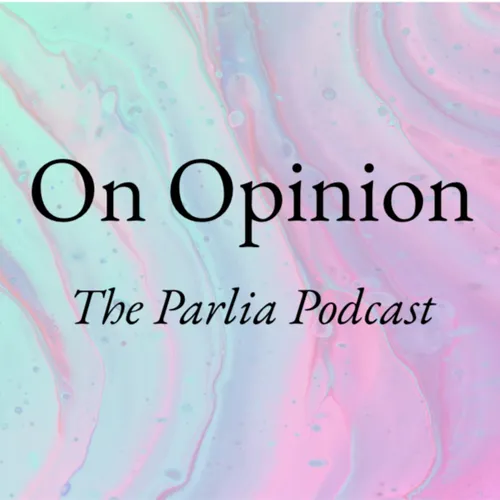
On Opinion
Where do your opinions come from?
Do we ‘think’ our world views, or ‘feel’ them? And what do our beliefs mean for politics and society?
In each episode of On Opinion, Turi Munthe asks thought leaders to share their perspectives on why we think what we think and what it means for the world today, discussing everything from the war on truth to how to argue with people you hate.
Hosted on Acast. See acast.com/privacy for more information.
- Update frequency
- every 6 days
- Average duration
- 44 minutes
- Episodes
- 45
- Years Active
- 2020 - 2022

Our Stone-Age Brains, with Maren Urner
S2 E29: Our Stone-Age Brains
“We have mental mechanisms that have been there since the Stone Age and no longer function in this environment”
Short-term thinking, lazy reasoning and stereotyping, and to…

The Spirituality Movement, with Jules Evans
S2 E28: The Spirituality Movement
“A lot of those who’ve left the church tend to be younger people, who nonetheless still consider themselves spiritual. They’ve been turned off by churches, but they h…

Generational Politics, with Bobby Duffy
S2 E27: Generational Politics
“If you truly understand what’s different between generations, you have a much better idea of what’s coming up in the future.”
It turns out there are very real differences…

Political Predisposition, with John Hibbing
S2 E26: Political Predisposition
“40% of the variance observed in political attitudes can be attributed to genetics”
Twin studies have suggested that one third of our political orientation can be trace…

Emotional Politics, with Omar Kholeif and Jonathan Sklar
S2 E25: On Emotion
“The world that we live in today is fuelled by heightened emotion…”
Over the course of these two seasons of On Opinion, we’ve looked at opinions through the lens of philosophy, psych…

The Journal of Controversial Ideas, with Francesca Minerva
S2 E24: The Journal of Controversial Ideas
“You can’t have a good education if you’re not exposed to ideas you don’t agree with”
Twelve years ago, Francesca Minerva published an academic article in the…

The Evolution of Cooperation, with Nichola Raihani
S2 E23: The Evolution of Cooperation
“Every multicellular being is a collective that operates as a whole - the individual is an ‘invention’ of evolution”
Cooperation is at work up everywhere - from our…

Psychometrics: measuring ourselves, with John Rust
### S2 E22: Psychometrics: measuring ourselves
> _“Psychometrics is one of the most important or influential areas of applied psychology”_
Psychometrics, the study of personality and ability, began wit…

On Inhumanity with David Livingstone Smith
“Dehumanisation both justifies and motivates acts of extraordinary violence - but it is not in any sense an innate disposition”
Here lies the terrifying quandary: if humans are the most social of all …

The Neuroscience of Dehumanisation, with Lasana Harris
“Dehumanisation is a psychological process, and every psychological process can be used for good or bad.”
Humanisation (attributing motive and consciousness) and dehumanisation are flip sides of commo…

Post-Privacy Politics, with Michal Kosinski
“We often treat privacy as a quick fix for much deeper social problems - like prejudice and bias”
Our lives are constantly documented. Our Facebook likes, our Tweets and even our credit card statement…

Polarisation on the Couch, with Alex Evans
“Our inner and outer crises are two sides of the same coin”
There are many lenses through which to explain polarisation - economic, political, demographic, evolutionary… Alex Evans wants us to conside…

Conflict is Good, with Ian Leslie
“The avoidance of conflict is actually the real problem”
We traditionally view an argument as a symptom of a problematic relationship, but relationship psychologists have found that they actually lead…

Investing in Injustice - System Justification Theory, with John Jost
“The disadvantaged don’t make the world, they cope with it”
Since Etienne de la Boetie’s Discourse on Voluntary Servitude (1577), we have asked ourselves why the weak, the poor and the marginalised ac…

Populism, with Jan-Werner Müller
"Populism is a permanent shadow of modern representative democracy, and a constant threat"
The last few decades has seen a democratic drift, as populist leaders emerge all over the world - from Bolson…

Infodemiology, with Jens Koed Madsen
“The more we increase the connectivity of people, the more people get stuck in extreme positions and echo chambers on the extreme edges of our belief structures.”
In December 2017, Jens Koed Madsen he…

Why we Believe, with Michael Shermer
Michael Shermer is one of the world’s most prominent skeptics - founder of The Skeptic Society and editor of its magazine Skeptic. Once a fundamentalist Christian, Michael has spent his career uncove…

The Backlash against Democracy, with Roberto Foa
Roberto Foa's research on Global Dissatisfaction with Democracy and Youth Dissatisfaction with Democracy uncovered the highest rates of dissatisfaction in decades, particularly amongst young people.
“…

Bridging the Gap, with Stephen Hawkins
“There’s a subtle but crucial difference between ‘Opponent’ and ‘Enemy’”
If Polarization is on the rise around the world, it takes different forms. The “Ideas Landscape” in the US, UK, France and Germ…

The Securitarian Personality, with John Hibbing
“The key division in all political systems is the result of two distinct perceptions of the most dangerous threats”
Western politics have traditionally been divided into Conservatives and Liberals - t…